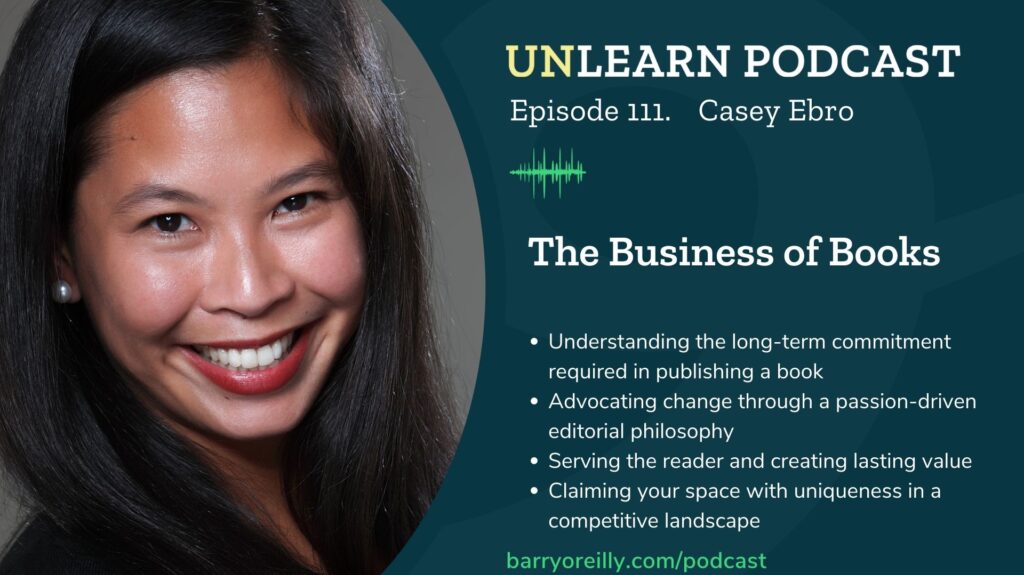Casey Ebro is a veteran editor who has significantly contributed to the publishing world. She formerly served as an Executive Editor with the Business Group at McGraw Hill Professional. In this role, she was responsible for acquiring, editing, and publishing business books in various subjects such as leadership, workplace culture, entrepreneurship, and innovation. She has been responsible for bestsellers and notable titles, including “Madoff Talks” by Jim Campbell, which inspired a Netflix documentary series, and the Wall Street Journal bestsellers “Connect First” by Melanie Katzman and “Zero to IPO” by Frederic Kerrest. Casey played a pivotal role at McGraw Hill in establishing the healthcare category into a robust multi-million dollar program, which featured prominent titles like the New York Times Science bestseller “The Digital Doctor” and “The Cleveland Clinic Way”. After her tenure at McGraw Hill, Casey transitioned to being a freelance editor. In this episode of Unlearn, Casey joins Barry O’Reilly to share insights into the world of publishing, and the not-so-unique challenges it presents to authors.
Starting Up and Striking Out
Casey’s journey into the world of editing began in her formative years as a passionate bookworm. In high school, she took a significant step toward her publishing dreams by becoming the English editor for her school’s literary publication called “Facets”. She reveled in the collaborative process with other editors and took pleasure in discovering the literary talents of her peers. Her passion further intensified in university, where she joined the literary publication named “Heights”, participating in deeper, more advanced discussions about submitted works. These university experiences exposed her to diverse opinions and debates, making the editing environment incredibly stimulating and enriching for her. [Listen from 1:55]

A Book is a Business
“Writing a book is like starting a business,” according to Casey. Authors are entrepreneurs introducing a unique product to the market. In essence, the book is a reflection of the author’s ideas and beliefs, and its promotion doesn’t end post-publication. Some successful books keep selling years or even decades after their release, and this continued success comes from the author’s dedication to the ideas and ensuring they reach as many readers as possible. Publishing a book is a long-term commitment that requires careful execution, planning, and motivation. “A lot of people think about it in terms of the first three months or the first six months or first year or first three years after a book is published. I think that’s really short sighted because if the ideas are good, they’re good from now till kingdom come,” Casey shares. A book, like a product, needs to find its audience, establish product-market fit, and receive investment for growth, Barry agrees. “It never ends.” [Listen from 8:00]
Investing in Ideas
Barry and Casey discuss the challenges of book publishing. Barry remarks that the journey isn’t just about having a great idea; it’s about putting in the necessary work to present the idea, penning an entire chapter about it, and then devising a plan on how to maximize its potential. Likening this to the startup experience, Barry notes, “It’s almost like I had to have a pitch deck. What’s the problem I’m solving? Who’s the target customer? What’s my go-to-market plan? How am I going to generate sales and then also write a chapter to exemplify the idea?” Casey comments that selecting a manuscript is similar to venture capitalists choosing a startup to invest in. Aligning with the right team and mission is imperative. She tells Barry, “This is our purpose. This is our mission and values. These are the goals. Here’s the thesis of the books that I believe in and want to bring to life.” [Listen from 12:55]
Casey shares her editorial philosophy, and that she’s driven by the idea of “publishing the change” she wants to see in the business world. To her, it’s not just about the numbers or market performance; it’s also about a genuine love for the idea and passion for the mission behind it. Barry agrees: long-term book commitment requires passion and enthusiasm. He emphasizes, “Even for authors as well, when you publish a book… It’s not new to you. And yet for people who find it the first time… that’s their first engagement with that idea. You have to keep it alive, believe in it.” [Listen from 16:00]
Your Mission? Service.
Casey believes authors are most successful when their books are at the service of the reader. The lasting value of a book stems from its ability to cater to the needs and interests of its readers, providing them with significant takeaways. Such books gain a life of their own, being recommended within communities and changing lives. Casey’s joy is evident when she says, “I read feedback that literally says, ‘Your book changed my life in every way’… This is why I do what I do.” She advises aspiring authors to deeply reflect on the reasons for their writing and what sets their work apart in the vast literary landscape: “Why should I, the reader, buy your book? Why you? Why not someone else? I hope these questions help clarify, because you need to be able to say, ’I am the only one. I am the only one who can write this.’” By delving into these existential queries, authors can hone in on their unique voice and what they bring to the table. [Listen from 25:25]
Looking Ahead
Casey wants authors to confidently claim their space, believing they are uniquely positioned to address a topic due to their specific experiences, inventions, or groundbreaking insights. This individuality becomes crucial when competing against established names in the industry, given that readers will be investing both money and time in their book. [Listen from 29:55]















